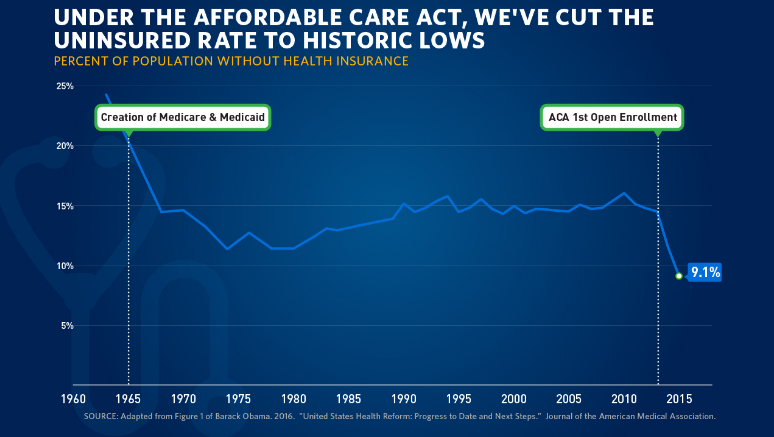President Obama Highlights Progress from Affordable Care Act
Obama noted the importance of the Affordable Care Act as being the most transformative pieces of legislation for the healthcare industry since the creation of the Medicare and Medicaid programs.

- When it comes to the Patient Protection and Affordable Care Act, the media has reported on a variety of opinions among healthcare experts and regulators regarding the benefits and disadvantages of the ACA. However, there has not been much in the way of showing the perspective of the the original Affordable Care Act authors six years after it was passed.

Earlier this week, President Barack Obama changed that in a paper he wrote for The Journal of the American Medical Association (JAMA). First, Obama noted the importance of the Affordable Care Act as being the most transformative pieces of legislation for the healthcare industry since the creation of the Medicare and Medicaid programs.
Before our current president took office, our healthcare delivery system was filled with rising costs and too many Americans without any substantial medical coverage. The Affordable Care Act, however, has brought healthcare coverage options for as many as 20 million Americans and offered new opportunities to reduce medical costs by implementing new government programs like the Medicare Shared Savings Program and accountable care organizations.
Before the ACA, there were a variety of problems within the healthcare industry that the Obama administration has attempted to mitigate including the lack of patient safety, uncoordinated care, and a stronghold on treating sick patients instead of keeping people healthy through preventive care. More importantly, Obama discussed how at least one out of seven Americans lacked health insurance and access to medical care.
The years since the ACA was passed has had a fair amount of complications especially in the courts and Congress, Obama wrote. However, there have been a variety of successes due to the Affordable Care Act. For instance, the uninsured rate has fallen by 43 percent with only 9.1 percent of Americans lacking healthcare coverage as of 2015.
With 20 million more people having health insurance, access to medical care has expanded significantly. Federal assistance to help states expand their Medicaid programs has contributed toward these gains, writes President Obama. Even in states that did not expand Medicaid, uninsured rates are plummeting.
In 2010 when the law was passed, more than 2 million young adults had the chance to remain on their parents’ health coverage until they turn 26 years of age. Additionally, the ACA required payers to fully cover the costs of preventive services, which may have led to a healthier population across the US in recent years with fewer individuals reporting poor health.
Additionally, the Affordable Care Act positioned private and public health payers to leave fee-for-service payment systems behind and follow a more value-based care approach to provider reimbursement.
In order to build upon the progress that the Affordable Care Act has brought the healthcare industry throughout the country, President Obama suggests for Congress to, once again, consider a public health insurance plan to compete alongside private payers on the exchanges. Obama explains that this will strengthen the health insurance marketplace and position more affordable coverage options for consumers nationwide.
"I am proud of the policy changes in the ACA and the progress that has been made toward a more affordable, high-quality, and accessible health care system. Despite this progress, too many Americans still strain to pay for their physician visits and prescriptions, cover their deductibles, or pay their monthly insurance bills; struggle to navigate a complex, sometimes bewildering system; and remain uninsured. More work to reform the health care system is necessary," Obama wrote.
"For most Americans in most places, the Marketplaces are working. The ACA supports competition and has encouraged the entry of hospital-based plans, Medicaid managed care plans, and other plans into new areas. As a result, the majority of the country has benefited from competition in the Marketplaces, with 88 percent of enrollees living in counties with at least three issuers in 2016, which helps keep costs in these areas low," Obama continued.
"However, the remaining 12 percent of enrollees live in areas with only one or two issuers. Some parts of the country have struggled with limited insurance market competition for many years, which is one reason that, in the original debate over health reform, Congress considered and I supported including a Medicare-like public plan. Public programs like Medicare often deliver care more cost-effectively by curtailing administrative overhead and securing better prices from providers. The public plan did not make it into the final legislation. Now, based on experience with the ACA, I think Congress should revisit a public plan to compete alongside private insurers in areas of the country where competition is limited. Adding a public plan in such areas would strengthen the Marketplace approach, giving consumers more affordable options while also creating savings for the federal government."
According to a White House news release, the ACA fueled the reduction of the uninsured rate across the United States, which has stagnated since the creation of the Medicare and Medicaid programs. Between 2013 to 2015, the states that expanded their Medicaid programs also saw major reductions in their uninsured rates.
Even though there has been plenty of movement in the right direction since the passage of the Affordable Care Act, too many Americans are still struggling to pay their out-of-pocket healthcare costs, insurance premium bills, and deductibles. The future of the healthcare industry will depend upon the progress that can be made upon the Affordable Care Act and any potential public coverage programs that could assist the American people further in their strive to pay for healthcare.
Dig Deeper:
Affordable Care Act Brought 30% Drop for Texas Uninsured Rate
Republicans Release Plan to Replace the Affordable Care Act

